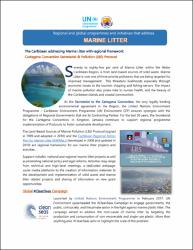/admin/item?itemID=44872356-cd72-4d34-91ad-acb30f8654e9
Regional and global programmes and initiatives that address marine litter

View/
Type of Access
OpenMaterial Type
BookletType of Content
Technical reportSubject
Gestión ambiental - PlanificaciónRecursos marinos
Contaminación ambiental
Residuos sólidos
Salud
Language
SpanishEnglish
Collection
- Gestión ambiental [2789]
Metadata
Show full item record| Abstract: | Seventy to eighty-five per cent of marine litter within the Wider Caribbean Region, is from land-based sources of solid waste. Marine litter is now one of three priority pollutants that are being targeted for improved management. This threatens livelihoods especially through economic losses to the tourism, shipping and fishing sectors. The impact of marine pollution also poses risks to human health, and the beauty of the Caribbean islands and coastal communities. The Land-Based Sources of Marine Pollution (LBS) Protocol (signed in 1999 and adopted in 2010) and the Caribbean Regional Action Plan for Marine Litter (RAPMaLI) (developed in 2008 and updated in 2010) are regional frameworks for important marine litter projects and activities. |
| Author(s): | United Nations Environment Programme (UNEP)
Caribbean Environment Programme (CEP) |
| Date: | 2019 |
| Published: | Kingston, Jamaica: UNEP Caribbean Environmental Programme |
| Citation: | United Nations Environment Programme (UNEP), Caribbean Environment Programme (CEP) (2019). Regional and global programmes and initiatives that address marine litter. Kingston, Jamaica: UNEP Caribbean Environmental Programme. Recuperado de: |
| URI: | https://bvearmb.do/handle/123456789/3138
|

